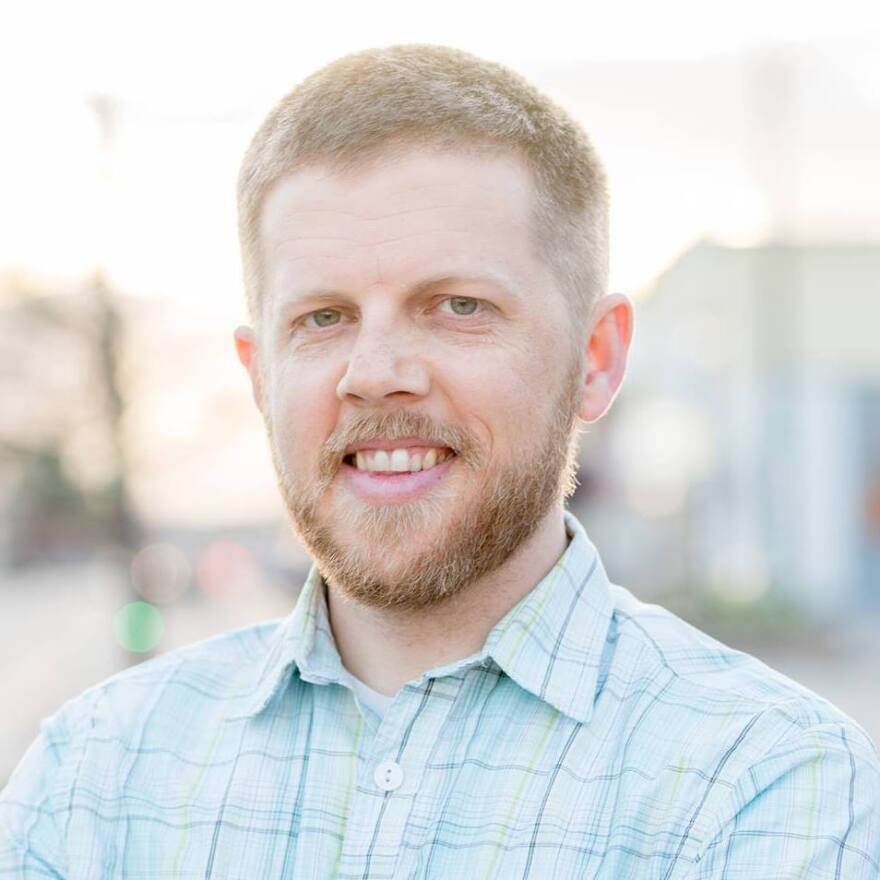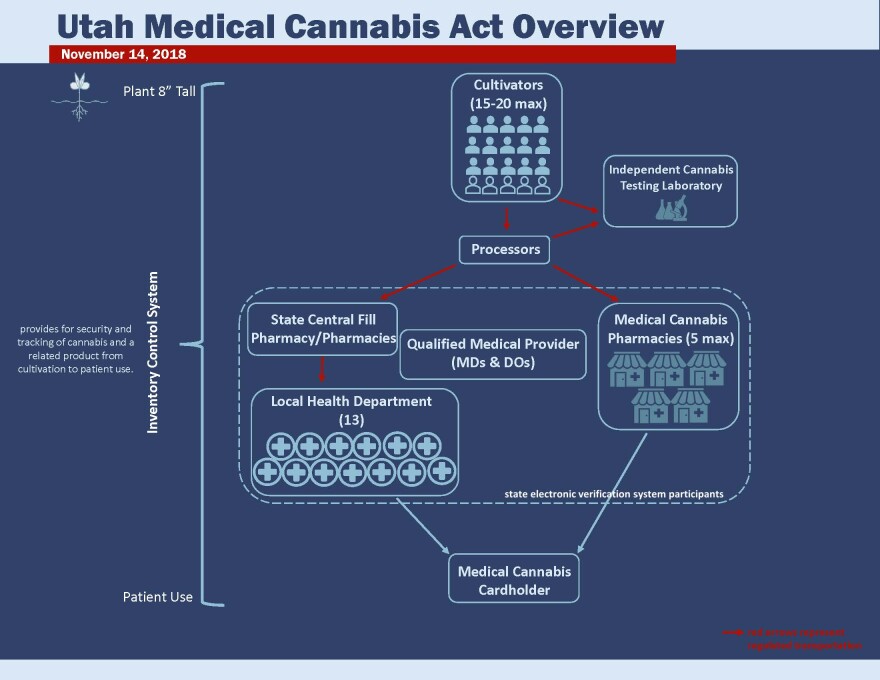Utah lawmakers will convene next week on Capitol Hill to hammer out a deal over Proposition 2, the ballot initiative voters approved to expand access to medical marijuana.

Stakeholders on opposite sides of the initiative came up with the draft legislation last month in an attempt to find common ground over distribution and sale of the drug. Opponents say the bill will help avoid unintended consequences, and supporters say it will keep the Legislature from overwriting the law entirely.
Connor Boyack of the Libertas Institute is a proponent of Prop 2 and helped broker the deal. He stopped by KUER to explain what’s in the new bill.
Julia Ritchey: It seems like one of the biggest changes in this draft legislation has to do with the distribution and sale of marijuana.
Connor Boyack: Yeah, there's actually been a lot of confusion about this. People have heard of this like central fill concept where it's going to be like the new DABC, but for weed, and this whole idea that there's going to be state control. Here's what's actually happening: There's kind of a dual path. In the latest proposal that came out, seven dispensaries are what are being called Medical Cannabis pharmacies — those are privately owned, all of the growers are privately owned and all the processors are privately owned. So the entire system, including seven dispensaries, is privately owned with the exception of one dispensary that will be state-owned.
This is an experiment on the part of the state to see if they can process credit cards and do things that through the local health department to increase access statewide. But that's kind of a separate thing, so even if you don't like the government control we still have this robust free-market privately owned regime with all of these cannabis industries.
JR: Will patients still be able to grow their own marijuana?
CB: Yeah, you know we had put in Proposition 2 "the trigger," as we call it, that if the government did not license dispensaries by a certain time then people would be able to grow their own. ...In the new proposal that's been removed — it's been replaced with a different trigger where if the dispensary is not licensed by a certain time, rather than being able to grow your own, you actually can't be prosecuted. We eliminate all power for prosecutors to go after these medical patients.
I think this is superior, because while a few people might want to grow their own and know how and want to go through all that, most folks are just going to go to West Wendover or to Mesquite or to Colorado — they just don't want to be bothered. This actually I think increases the ability of patients to freely use it if they can't be getting it from a dispensary. So there's not going to be any growing in Utah for private people doing it for themselves other than through these businesses.

JR: Another question I saw a lot was about edibles — will edibles still be allowed under this compromise?
CB: Part of the overall theme of the compromises that it's trying to be increasingly medicinal. … . As part of the negotiations we lost kind of the broader edibles but we've retained this cube shaped either gummy or lozenge. So you can get edibles but it can't be appealing — it can't look like gummy worms or gummy bears — it's in this kind of boring looking cube shape. Which actually this is on the market, I've seen other dispensary selling cubes shaped gummies. If people want edibles it'll just be constrained to that format.
JR: And the list of qualifying illnesses and diseases that patients may have in order to get a card, has that narrow it at all?
CB: It's narrowed and expanded ... I mean there's kind of some give and take here. We lost what are called in Proposition 2 “other autoimmune diseases” in addition to the ones that were listed, like M.S. and so forth. We lost the open ended other gastrointestinal disorders other than the still existing — Crohn's disease and ulcerative colitis. There were these kind of “catch-all” provisions that we put in that the opposition really didn't like. They were worried that that was open-ended. So those have been eliminated: those kind of broad catch-alls.
However, we've also added terminal conditions, which the legislature actually approved in a separate bill earlier this year, so there was already interest in adding that to this new proposal. We added hospice as well. We actually got a new definition of pain, which doesn't require you to have any interaction with opiates which is great under Proposition 2. The doctor can only give you cannabis for pain if they feel that you're at risk of overdosing or you're allergic to opioids.
We've removed opioids entirely from the equation in the new proposal so that basically if you have more than a couple of weeks of pain and you've tried either like an ibuprofen or an Advil or something and that hasn't helped, or you've tried a physical intervention like chiropractic care, massage or acupuncture and that hasn't worked. If you try one or the other then you qualify. It's a better definition, I think, and one that does not steer physicians towards having to have consideration for opioids because of the crisis that we're in.
JR: Any changes as to how to get a card?
CB: It's going to be the same as it is under Proposition 2 with the exception of individuals under the age of 21. What we've now done is in addition to your physician giving you approval, individuals under 21 have to go to this “compassionate use board” and just get a second pair of eyeballs. When you're using any psychoactive substance, including prescription drugs, for children whose brains are still developing, that's a concern for a lot of folks. So out of a desire to have a second pair of eyeballs and make sure everything is on the up and up when dealing with youth, we added in that second layer of protection to make sure that there's no abuse or anything going poorly.
JR: There are some provisions dealing with decriminalization that will already be in effect when lawmakers meet next week. What should patients know who want to start using before the compromise is signed into law?
CB: This is what's called an affirmative defense — basically, the ability to go into court and have a “get out of jail free card.” So you can still be arrested, and technically, it's illegal. Let's say Dec. 1, right, as soon as Proposition 2 goes into effect, you can still get arrested. You can still get prosecuted, but if you go in the court the prosecution has to overcome your doctors. Now they have to show somehow that that's invalid. What's more realistic is that should you ever be caught and have a doctor's note or some way to substantiate that you have something like cancer or M.S., a prosecutors isn’t going to want to waste his time, so he's just not going to file charges.
That same process is carried through in the proposal. As long as you've got the qualifying condition, you've got a doctor who attested that you would benefit from cannabis and you're using cannabis and one of the approved formats. If you're caught with gummy bears, that's going to be illegal — you won't be covered. But if you're using your oil or your patch or your lotion or your vape pen or whatever, you'll be covered and you'll be protected in court from being prosecuted.
JR: What are the odds that lawmakers will continue to tinker with this legislation or even going for it in the next session, wat's to stop a lawmaker from trying to change some of the things that you have already agreed to with other stakeholders?
CB: It's an important question and it gets to the broader question of how we are doing this at all. A lot of people have the misunderstanding that in Utah it's like in some other states where the legislature can't touch a ballot initiative. In Utah that's not true. Here the legislature has the full authority to repeal an entire ballot initiative if they wanted to. That's why we entered into these negotiations in anticipation of the legislature trying to gut what we had done in Proposition 2.
But now that we've entered into those negotiations we have a very broad group of stakeholders. All of the opposition has basically come to the table and now explicitly endorses what we've done. It really just incentivizes some rogue legislator from trying to come at us sideways with an amendment.
JR: Not all medical marijuana advocates are on board with this deal as you just suggested. One group is even threatening to sue over it. Shouldn't lawmakers have to abide by what voters approved in the original proposition?
CB: I operate from reality and not fantasy. There's this fantasy that ‘Oh, the Legislature should leave Prop 2 alone.’ Even though we wish it were so that they would leave it alone, the entire establishment we've known forever hates Proposition 2. You got the governor's office, the House, the Senate, law enforcement, church groups and many others in that machine. You saw their press conference where they all came out against it. That was the “who's who” of Utah leadership all coming out against Proposition 2.
To think that the ballot initiative will remain protected against that establishment force when your average citizen who feels passionately about this doesn't have power, doesn't have money ... doesn't have influence. We have to be frank about the situation that we're in and recognize that notwithstanding Proposition 2 passing we don't have the ability to forever defend it from being touched at all. That's why these negotiations have been so important.
JR: Where can people go to find more information on the bill?
CB: So if you go to the legislature's website, there's a section of the bottom called resources. And if you click on that it'll show “The Utah Medical Cannabis Act.” And so that's where the public can see the latest proposal.
Later today [Monday, Nov. 26] at 3 p.m. will be a committee hearing up at the Capitol. You can stream it live. … And then in about a week will be the special session where again it will be public and streamed online.
Some questions and responses have been edited for length and clarity.





